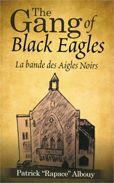
 |
Why did Patrick's mother abandon him? Will she ever come back? Where is God amid a six-year-old's loneliness and feeling of betrayal? Life will answer some of these questions for Patrick during childhood, imbuing him with profound peace. He wonders to this day about the answers to others. What he knows for sure is that in November of 1953, his deeply depressed single mother dropped him off at an orphanage for the children of Russian refugees in France known as The Russian Boarding School. The school is a repurposed medieval castle, complete with an aristocratic lady, exiled during the Russian Revolution, whom staff and students alike call "the Princess."
The Princess, in turn, calls Patrick "a magical boy." His sensitivity and wisdom beyond his years are not lost on her, particularly when she discovers that she and Patrick have seen each other in their dreams, riding the same unicorn! She and the rest of Patrick's teachers encourage his vast imagination in ways his mother never did, all the while giving him a basic education that includes instruction in the Russian Orthodox religion, which he would not be free to practice in Communist Russia of the 1950s. It is, in fact, their collective gentle instruction that allows Patrick to heal and reach out to befriend, among other boys, Nicolai, a child traumatized and left mute after he watched the beating death of his mother. Patrick realizes that God has allowed him to be in the orphanage to support others who are as desperately unhappy as he is and, in some cases, even more so.
This is a novel heavily based on the author's childhood. Albouy lived in an orphanage from age six to age seventeen, when he reunited with his mother and moved into her apartment. He readily admits that even his sensitive self experienced moments of an entirely human desire to make boyish mischief as he aged. As adolescents, he and his closest friends received the nickname The Gang of Black Eagles because of their inseparableness and their unceasing search for adventure. Trying to create a reputation for themselves, they briefly shoplifted and engaged in other petty crimes in their community. At the same time, they broke as many rules of the orphanage itself as they dared. Albouy remembers being a fan of the new craze of the '50s—rock-and-roll—and enjoying a dance with a pretty girl as much as anyone. These recollections keep the narrative from a tone of extreme religiosity.
Still, teenage bravado cannot entirely hide Patrick's fancifully tender nature. He recounts to his friends a conversation he claims to have had with an injured raven. Their unquestioning belief in what he says sets him apart as the gang's leader. Patrick shows a softness and vulnerability more commonly seen in male protagonists in the novels of such Victorian authors as Charles Dickens or Nathaniel Hawthorne. Indeed, the text has a strong Victorian voice throughout. Thus, it might appeal to lovers of that era's literature. Its magical element could also catch the interest of a reader who enjoys children's fairytales or the writings of Alexander Pushkin, one of whose poems features prominently in the story.